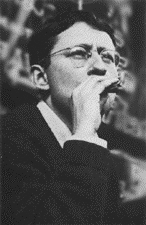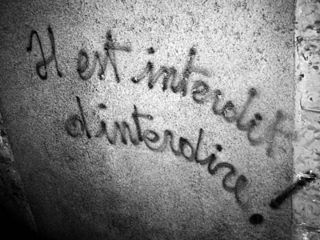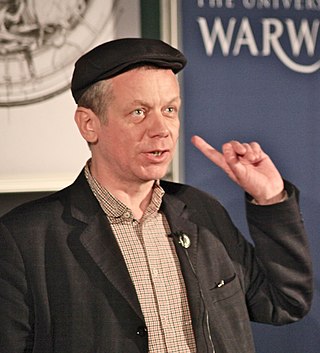
The Situationist International (SI) was an international organization of social revolutionaries made up of avant-garde artists, intellectuals, and political theorists. It was prominent in Europe from its formation in 1957 to its dissolution in 1972. The intellectual foundations of the Situationist International were derived primarily from libertarian Marxism and the avant-garde art movements of the early 20th century, particularly Dada and Surrealism. Overall, situationist theory represented an attempt to synthesize this diverse field of theoretical disciplines into a modern and comprehensive critique of mid-20th century advanced capitalism.

Guy-Ernest Debord was a French Marxist theorist, philosopher, filmmaker, critic of work, member of the Letterist International, founder of a Letterist faction, and founding member of the Situationist International. He was also briefly a member of Socialisme ou Barbarie.

The Letterist International (LI) was a Paris-based collective of radical artists and cultural theorists between 1952 and 1957. It was created by Guy Debord and Gil J. Wolman rejoined by Jean-Louis Brau and Serge Berna as a schism from Isidore Isou's Lettrist group. The group went on to join others in forming the Situationist International, taking some key techniques and ideas with it.

Psychogeography is the exploration of urban environments that emphasizes interpersonal connections to places and arbitrary routes. It was developed by members of the Letterist International and Situationist International, which were revolutionary groups influenced by Marxist and anarchist theory as well as the attitudes and methods of Dadaists and Surrealists.

The London Psychogeographical Association (LPA), sometimes referred to as the London Psychogeographical Committee, is an organisation devoted to psychogeography. The LPA is perhaps best understood in the context of psychogeographical praxis.

The dérive is an unplanned journey through a landscape, usually urban, in which participants stop focusing on their everyday relations to their social environment. Developed by members of the Letterist International, it was first publicly theorized in Guy Debord's "Theory of the Dérive" (1956). Debord defines the dérive as "a mode of experimental behaviour linked to the conditions of urban society: a technique of rapid passage through varied ambiances."

The Society of the Spectacle is a 1967 work of philosophy and Marxist critical theory by Guy Debord where he develops and presents the concept of the Spectacle. The book is considered a seminal text for the Situationist movement. Debord published a follow-up book Comments on the Society of the Spectacle in 1988.

Anti-art is a loosely used term applied to an array of concepts and attitudes that reject prior definitions of art and question art in general. Somewhat paradoxically, anti-art tends to conduct this questioning and rejection from the vantage point of art. The term is associated with the Dada movement and is generally accepted as attributable to Marcel Duchamp pre-World War I around 1914, when he began to use found objects as art. It was used to describe revolutionary forms of art. The term was used later by the Conceptual artists of the 1960s to describe the work of those who claimed to have retired altogether from the practice of art, from the production of works which could be sold.

La Société du Spectacle is a black-and-white 1974 film by the Situationist Guy Debord, based on his 1967 book of the same name. It was Debord's first feature-length film. It uses found footage and détournement in a radical Marxist critique of mass marketing and its role in the alienation of modern society.
The Pursuit of the Millennium: Revolutionary Millenarians and Mystical Anarchists of the Middle Ages is Norman Cohn's study of millenarian cult movements.

Michèle Bernstein is a French novelist and critic, most often remembered as a member of the Situationist International from its foundation in 1957 until 1967, and as the first wife of its most prominent member, Guy Debord.

Richard Barbrook is an academic in the School of Social Sciences, Humanities and Languages at the University of Westminster.
Gil Joseph Wolman was a French artist. His work encompassed painting, poetry and film-making. He was a member of Isidore Isou's avant garde Letterist movement in the early 1950s, then becoming a central figure in the Letterist International, the group which would subsequently develop into the Situationist International.

The spectacle is a central notion in the Situationist theory, developed by Guy Debord in his 1967 book The Society of the Spectacle. In the general sense, the spectacle refers to "the autocratic reign of the market economy which had acceded to an irresponsible sovereignty, and the totality of new techniques of government which accompanied this reign." It also exists in a more limited sense, where spectacle means the mass media, which are "its most glaring superficial manifestation."

Mémoires (Memories) is an artist's book made by the French social critic Guy Debord in collaboration with the Danish artist Asger Jorn. Its last page mentions that it was printed in 1959, however, it was printed in December 1958. This publication is the second of two collaborative books by Jorn and Debord whilst they were both members of the Situationist International.

A Game of War is a book by Guy Debord and Alice Becker-Ho that illustrates a game devised by Debord by giving a detailed account of one of their table-top conflicts. It was first published in French as Le Jeu de la Guerre in 1987, but unsold copies were later pulped in 1991, along with other books by Debord, at his insistence when he left his publisher Champ libre. The book was reissued in 2006, with an English translation published by Atlas Press in 2008.
Donald Nicholson-Smith is a translator and freelance editor, interested in literature, art, psychoanalysis, social criticism, theory, history, crime fiction, and cinema. Born in Manchester, England, he was an early translator of Situationist material into English. He joined the English section of the Situationist International in 1965 and was expelled in December 1967. He lives in New York City.

Report on the Construction of Situations is the founding Manifesto of the Situationist International revolutionary organization. The pamphlet was published by Guy Debord in June 1957, and the following month the organization was founded in Cosio d'Arroscia, Italy.
Situation is a concept developed by French philosopher Jean-Paul Sartre. It refers to "how ritualized action might be avoided or at least confronted consciously as contrary to the subject's freedom of nihilation". It was first expressed in his 1943 work Being and Nothingness, where he wrote that:
[T]here is freedom only in a situation, and there is a situation only through freedom [...] There can be a free for-itself only as engaged in a resisting world. Outside of this engagement the notions of freedom, of determination, of necessity lose all meaning.

History and Class Consciousness: Studies in Marxist Dialectics is a 1923 book by the Hungarian philosopher György Lukács, in which the author re-emphasizes the philosopher Georg Wilhelm Friedrich Hegel's influence on the philosopher Karl Marx, analyzes the concept of "class consciousness," and attempts a philosophical justification of Bolshevism.












